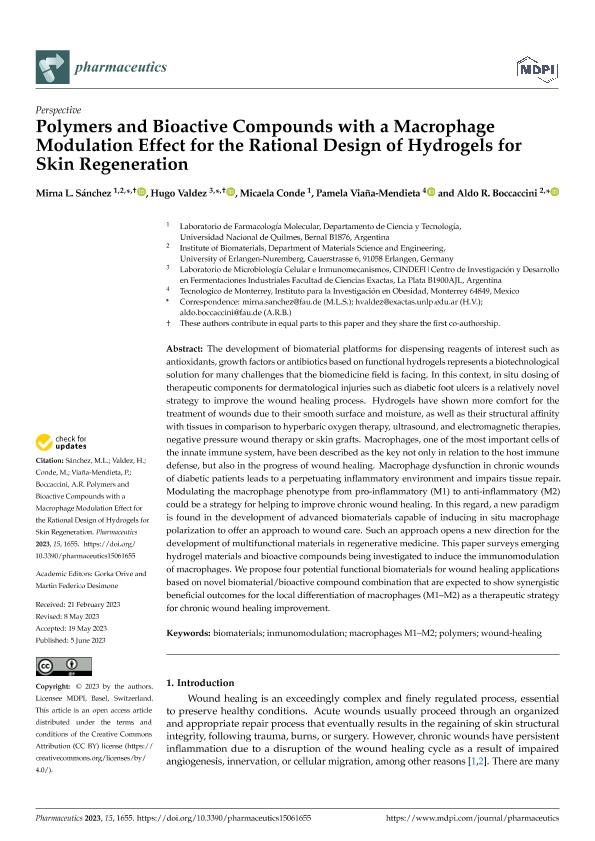Mostrar el registro sencillo del ítem
dc.contributor.author
Sánchez, Mirna L.
dc.contributor.author
Valdez, Hugo Alberto

dc.contributor.author
Conde, Micaela
dc.contributor.author
Viaña Mendieta, Pamela
dc.contributor.author
Boccaccini, Aldo R.

dc.date.available
2024-02-02T12:10:36Z
dc.date.issued
2023-06
dc.identifier.citation
Sánchez, Mirna L.; Valdez, Hugo Alberto; Conde, Micaela; Viaña Mendieta, Pamela; Boccaccini, Aldo R.; Polymers and Bioactive Compounds with a Macrophage Modulation Effect for the Rational Design of Hydrogels for Skin Regeneration; Multidisciplinary Digital Publishing Institute; Pharmaceutics; 15; 6; 6-2023; 1-17
dc.identifier.issn
1999-4923
dc.identifier.uri
http://hdl.handle.net/11336/225547
dc.description.abstract
The development of biomaterial platforms for dispensing reagents of interest such as antioxidants, growth factors or antibiotics based on functional hydrogels represents a biotechnological solution for many challenges that the biomedicine field is facing. In this context, in situ dosing of therapeutic components for dermatological injuries such as diabetic foot ulcers is a relatively novel strategy to improve the wound healing process. Hydrogels have shown more comfort for the treatment of wounds due to their smooth surface and moisture, as well as their structural affinity with tissues in comparison to hyperbaric oxygen therapy, ultrasound, and electromagnetic therapies, negative pressure wound therapy or skin grafts. Macrophages, one of the most important cells of the innate immune system, have been described as the key not only in relation to the host immune defense, but also in the progress of wound healing. Macrophage dysfunction in chronic wounds of diabetic patients leads to a perpetuating inflammatory environment and impairs tissue repair. Modulating the macrophage phenotype from pro-inflammatory (M1) to anti-inflammatory (M2) could be a strategy for helping to improve chronic wound healing. In this regard, a new paradigm is found in the development of advanced biomaterials capable of inducing in situ macrophage polarization to offer an approach to wound care. Such an approach opens a new direction for the development of multifunctional materials in regenerative medicine. This paper surveys emerging hydrogel materials and bioactive compounds being investigated to induce the immunomodulation of macrophages. We propose four potential functional biomaterials for wound healing applications based on novel biomaterial/bioactive compound combination that are expected to show synergistic beneficial outcomes for the local differentiation of macrophages (M1–M2) as a therapeutic strategy for chronic wound healing improvement.
dc.format
application/pdf
dc.language.iso
eng
dc.publisher
Multidisciplinary Digital Publishing Institute
dc.rights
info:eu-repo/semantics/openAccess
dc.rights.uri
https://creativecommons.org/licenses/by/2.5/ar/
dc.subject
BIOMATERIALS
dc.subject
INMUNOMODULATION
dc.subject
MACROPHAGES M1–M2
dc.subject
POLYMERS
dc.subject
WOUND-HEALING
dc.subject.classification
Tecnologías que involucran la manipulación de células, tejidos, órganos o todo el organismo

dc.subject.classification
Biotecnología de la Salud

dc.subject.classification
CIENCIAS MÉDICAS Y DE LA SALUD

dc.title
Polymers and Bioactive Compounds with a Macrophage Modulation Effect for the Rational Design of Hydrogels for Skin Regeneration
dc.type
info:eu-repo/semantics/article
dc.type
info:ar-repo/semantics/artículo
dc.type
info:eu-repo/semantics/publishedVersion
dc.date.updated
2024-01-31T13:08:55Z
dc.journal.volume
15
dc.journal.number
6
dc.journal.pagination
1-17
dc.journal.pais
Suiza

dc.journal.ciudad
Basilea
dc.description.fil
Fil: Sánchez, Mirna L.. Universidad Nacional de Quilmes. Departamento de Ciencia y Tecnología. Laboratorio de Farmacología Molecular; Argentina. Universitat Erlangen-Nuremberg; Alemania
dc.description.fil
Fil: Valdez, Hugo Alberto. Consejo Nacional de Investigaciones Científicas y Técnicas. Centro Científico Tecnológico Conicet - La Plata. Centro de Investigación y Desarrollo en Fermentaciones Industriales. Universidad Nacional de La Plata. Facultad de Ciencias Exactas. Centro de Investigación y Desarrollo en Fermentaciones Industriales; Argentina
dc.description.fil
Fil: Conde, Micaela. Universidad Nacional de Quilmes. Departamento de Ciencia y Tecnología. Laboratorio de Farmacología Molecular; Argentina
dc.description.fil
Fil: Viaña Mendieta, Pamela. Instituto para la Investigación en Obesidad; México
dc.description.fil
Fil: Boccaccini, Aldo R.. Universitat Erlangen-Nuremberg; Alemania
dc.journal.title
Pharmaceutics
dc.relation.alternativeid
info:eu-repo/semantics/altIdentifier/url/https://www.mdpi.com/1999-4923/15/6/1655
dc.relation.alternativeid
info:eu-repo/semantics/altIdentifier/doi/http://dx.doi.org/10.3390/pharmaceutics15061655
Archivos asociados
